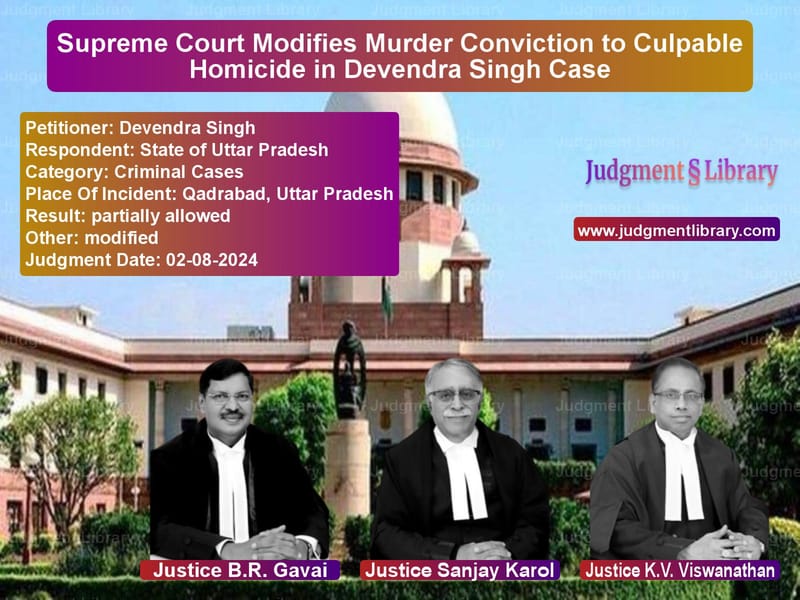Supreme Court Modifies Murder Conviction to Culpable Homicide in Devendra Singh Case
The Supreme Court recently delivered a judgment in the case of Devendra Singh vs. State of Uttar Pradesh, modifying the conviction of the appellant from Section 302 IPC (murder) to Section 304 Part-I IPC (culpable homicide not amounting to murder). The ruling highlighted the importance of evaluating the nature of intent in violent altercations and emphasized that not every fatal attack should automatically result in a murder conviction.
Background of the Case
The case dates back to May 29, 1986, when Devendra Singh was accused of fatally stabbing Parpoor Singh during a dispute in Qadrabad, Uttar Pradesh. The prosecution alleged that the appellant and his co-accused, Yogendra Pratap Singh, attacked the victim with a knife during a marriage procession.
The Trial Court convicted Devendra Singh under Section 302 IPC and sentenced him to life imprisonment. The Allahabad High Court upheld the conviction in 2019, rejecting his appeal. Devendra Singh then moved the Supreme Court, where his counsel argued for reducing the charge from murder to culpable homicide.
Petitioner’s Arguments
The defense, led by advocate Rukhmini Bobde, made the following key arguments:
- The incident occurred in the heat of passion during a sudden quarrel, without premeditation.
- The weapon used was a pocketknife, not a deadly weapon usually associated with a murder charge.
- Devendra Singh inflicted only a single knife injury on the victim, which does not suggest an intent to kill.
- The accused himself sustained multiple injuries, proving that a scuffle had taken place.
- The prosecution failed to explain the injuries sustained by the accused, which should raise reasonable doubt.
Respondent’s Arguments
The prosecution, represented by Senior Additional Advocate General Garima Prashad, opposed the appeal, contending:
- The accused had a clear motive stemming from a previous altercation, where he had allegedly molested the wife of the deceased’s elder brother.
- There was a direct threat issued by the accused before the attack, indicating premeditation.
- The injury inflicted was fatal and intended to cause death.
- Both the Trial Court and the High Court found no reason to modify the sentence, as the evidence established an intentional and targeted attack.
Supreme Court’s Observations
The Supreme Court carefully examined the evidence, including eyewitness accounts and medical reports, and made the following key observations:
- The altercation between the accused and the deceased was not planned but arose suddenly during the marriage procession.
- The accused had no prior preparation for the attack and used a small pocketknife that he carried.
- The deceased received only one stab wound, while the accused himself sustained multiple injuries, suggesting a scuffle.
- The prosecution failed to prove that the accused took undue advantage or acted with extreme cruelty.
- Given these factors, the case falls within Exception 4 of Section 300 IPC, which applies when a person commits homicide during a sudden quarrel without premeditation.
Final Judgment
On August 2, 2024, the Supreme Court ruled:
- The conviction under Section 302 IPC was modified to Section 304 Part-I IPC.
- The appellant’s sentence was reduced from life imprisonment to 8 years of rigorous imprisonment.
- The prosecution’s failure to explain the accused’s injuries was taken as an adverse inference.
Implications of the Judgment
The ruling sets an important precedent for distinguishing between murder and culpable homicide in cases where the intent to kill is not clear-cut:
- Clarifies Legal Distinction: The judgment reinforces that a single blow inflicted in a sudden fight should not always be classified as murder.
- Protection of Fair Trial: It prevents excessive sentencing when there is evidence of provocation or a lack of premeditation.
- Guidance for Future Cases: The case sets a benchmark for similar appeals where the accused had no intention to kill but acted in the heat of the moment.
Comparison with Similar Cases
The Supreme Court has previously made similar observations in other cases:
- K.M. Nanavati vs. State of Maharashtra (1961): The Court held that culpable homicide applies when there is sudden provocation.
- Suraj Jagannath Jadhav vs. State of Maharashtra (2022): The Supreme Court reduced a murder conviction to culpable homicide where a single stab wound was inflicted in a heated moment.
Conclusion
The Supreme Court’s decision in Devendra Singh vs. State of Uttar Pradesh reaffirms that not all fatal altercations qualify as murder. By reducing the sentence from life imprisonment to 8 years, the Court ensured a fair application of the law, balancing justice for the deceased while acknowledging the circumstantial factors surrounding the crime.
Petitioner Name: Devendra Singh.Respondent Name: State of Uttar Pradesh.Judgment By: Justice B.R. Gavai, Justice Sanjay Karol, Justice K.V. Viswanathan.Place Of Incident: Qadrabad, Uttar Pradesh.Judgment Date: 02-08-2024.
Don’t miss out on the full details! Download the complete judgment in PDF format below and gain valuable insights instantly!
Download Judgment: devendra-singh-vs-state-of-uttar-prade-supreme-court-of-india-judgment-dated-02-08-2024.pdf
Directly Download Judgment: Directly download this Judgment
See all petitions in Murder Cases
See all petitions in Bail and Anticipatory Bail
See all petitions in Attempt to Murder Cases
See all petitions in Public Interest Litigation
See all petitions in Judgment by B R Gavai
See all petitions in Judgment by Sanjay Karol
See all petitions in Judgment by K.V. Viswanathan
See all petitions in partially allowed
See all petitions in Modified
See all petitions in supreme court of India judgments August 2024
See all petitions in 2024 judgments
See all posts in Criminal Cases Category
See all allowed petitions in Criminal Cases Category
See all Dismissed petitions in Criminal Cases Category
See all partially allowed petitions in Criminal Cases Category







